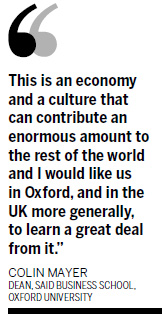Investment
New forum tackles worldwide woes
By Mark Hughes (China Daily)
Updated: 2010-09-20 07:45
 |
Large Medium Small |

|
Lord Patten, chancellor of Oxford University, said the university was doing a great deal of research collaboration with China, principally but not exclusively in the field of biomedicine, chronic disease and epidemiological study. Provided to China Daily |
Academics, policy makers and business people discuss ways to prevent another financial crash
BEIJING - Amid the tranquil setting of Diaoyutai Guest House for visiting VIPs some 160 of the biggest movers and shakers in Chinese financial circles gathered on Sept 9 to thrash out what, if anything, can be done to prevent another global financial meltdown.
Luminaries such as Zhang Jianhua, director-general of the research bureau of the People's Bank of China, Shan Zhu, chief operating officer of Xinhua Finance Ltd, and Guo Shuqing, chairman of China Construction Bank, gathered under the auspices of the first Oxford China Business Forum.
The prestigious event was organized by the University of Oxford's China Centre and the Said Business School of the University of Oxford in collaboration with the China Development Research Foundation.
For Professor Colin Mayer, dean of SBS, it was a crowning moment for the school, founded in 1996. The charcoal pinstripe besuited, steel-rimmed bespectacled, tall and dapper economist with a bewildering list of academic and public office credentials to his name had spent months organizing what is now to be an annual event which, it is hoped, will bring better corporate governance to the world of business and a higher degree of rationality to financial markets.
After an opening speech by the UK's Lord Patten, the chancellor of Oxford University, the assembled executives, lawyers, policy makers and academics discussed the development and maturation of China's financial markets from government and business, Chinese and international perspectives. Speakers included Zhou Xiaochuan, governor of the People's Bank of China, Dominic Barton, global managing director of McKinsey and Company, and Jesse Wang, executive vice-president and chief risk assessment officer of China Investment Corporation.
Discussion then turned to global financial markets, focusing on current developments and concerns, with contributions from Lu Mai, secretary-general of the China Development Research Foundation, Yu Yongding of the Chinese Academy of Social Sciences and president of the China Society of World Economy and special adviser to the president of the European Bank for Reconstruction and Development, and Stuart Popham, senior partner at Clifford Chance legal firm.
A third session looked at influential new ideas in financial economics, including viewing financial crises as pandemic events, short-termism in financial markets and how financial markets are shaped by non-rational behavior. That session was chaired by Professor Mayer and included panelists Andrew Haldane, executive director for financial stability at the Bank of England, Ian Goldin, director of Oxford University's 21st Century School, and Zhou Xunyu, Nomura professor for mathematical finance and a member of the Oxford-Man Institute at Oxford University.
Guo Shuqing, a leading reformer, closed the day with a speech on China's role in global financial development.
Speaking afterward, Lord Patten said: "One of the keys to stabilizing financial markets and guarding them against future risks lies in the excellence of research so we can explore the lessons of the past to inform new economic thinking. We are delighted that some of the top financial institutions in China have engaged in the inaugural Oxford China Business Forum as China is one of the great forces in the global economy."
Wang Mengkui, chairman of the China Development Research Foundation (CDRF), said: "The forum marks increasing influence on China for the University of Oxford and adds a new chapter to China-UK relations. After the recent crisis, the world economy is entering a period of low growth, structural adjustment and institutional reconstruction, which, however, is accompanied by intense innovation and rapid growth of new industries. Attended by thought leaders of public policy, business and academia from China, the UK and other countries, the forum is expected to respond to this period with new economic thinking on significant issues of world concerns."
One of the key speakers, Dr Ian Goldin, director of the James Martin 21st Century School at the University of Oxford, who was vice-president of the World Bank until 2006, said: "The prompt and robust response of China to the economic crisis has protected the Chinese economy and has been a vital stabilizing force for the world economy. It is clear to me that China has a key role to play in helping the world address new systemic risks and the effective management of the new 21st century challenges."
Professor Mayer said there had been too much emphasis on short-termism in business and that a much more international approach was needed given the global interaction of markets. However, he added, there are as yet no institutions that could provide appropriate regulations.
He said the format of the G20, which meets in November, was the international response to the fact financial markets have become more interconnected. It was also a response to the needs of developing countries. He said it was essential to encourage the development of regulatory institutions with cross-border responsibilities and added that countries such as China could play a critical role because its own actions had helped it avoid the worst effects of the global financial crisis.
He also predicted China would develop more sophisticated regulatory tools and could play a steering role. "It is going to become an increasingly important player," he said.

Part of the forum's function was to satisfy the intellectual curiosity of Said's students and promote high-level debate. It was also a vehicle to promote the school, which he said ranked in the top 20 of educational establishments that award MBAs.
Professor Mayer said offering education to non-British residents was becoming extremely important to the UK economy.
As far as China was concerned, he said he was interested in seeing more emphasis on the development of markets and the "real" economy, particularly for small- and medium-sized businesses. He was also keen to see a better balance between State-owned enterprises and small- and medium-sized companies. The professor also wanted to witness the development of financing enterprise activities in China, particularly of new financial instruments along the lines of index futures, the greater use of venture capital funding and private equity. "Critical to success will be policy developments," he said. "As the private sector expands, there will be a need for more emphasis on getting corporate governance right. The forum has been focusing on the issues China faces forward as well as its successes in the past."
Asked about what abiding thought he had regarding his time in China, having spent a week sightseeing, he said: "This is an economy and a culture that can contribute an enormous amount to the rest of the world and I would like us in Oxford, and in the UK more generally, to learn a great deal from it."
China Daily
